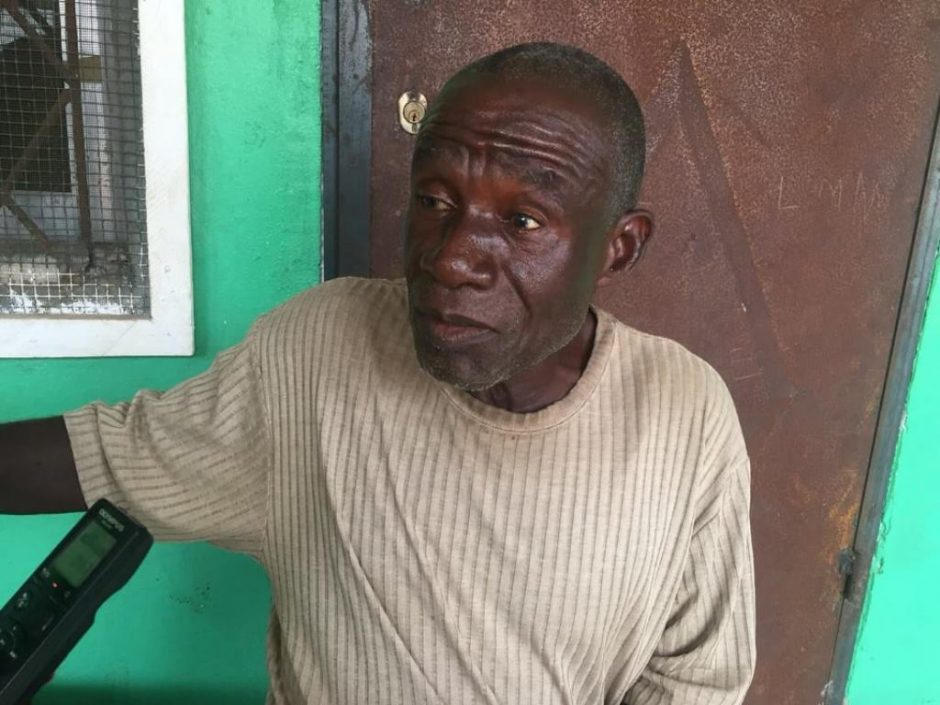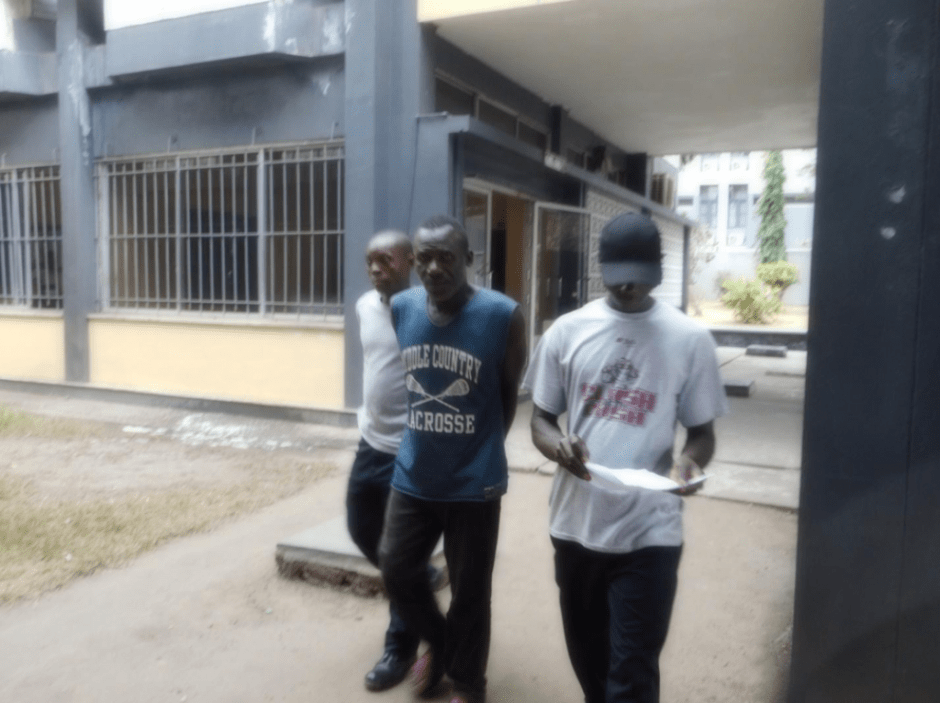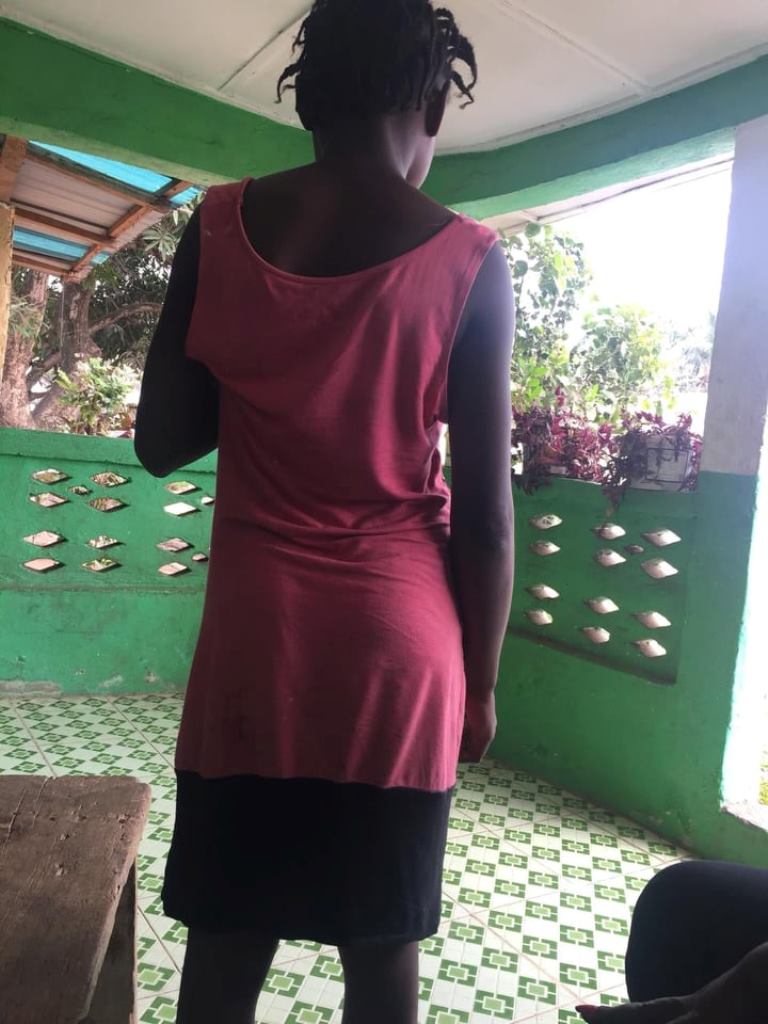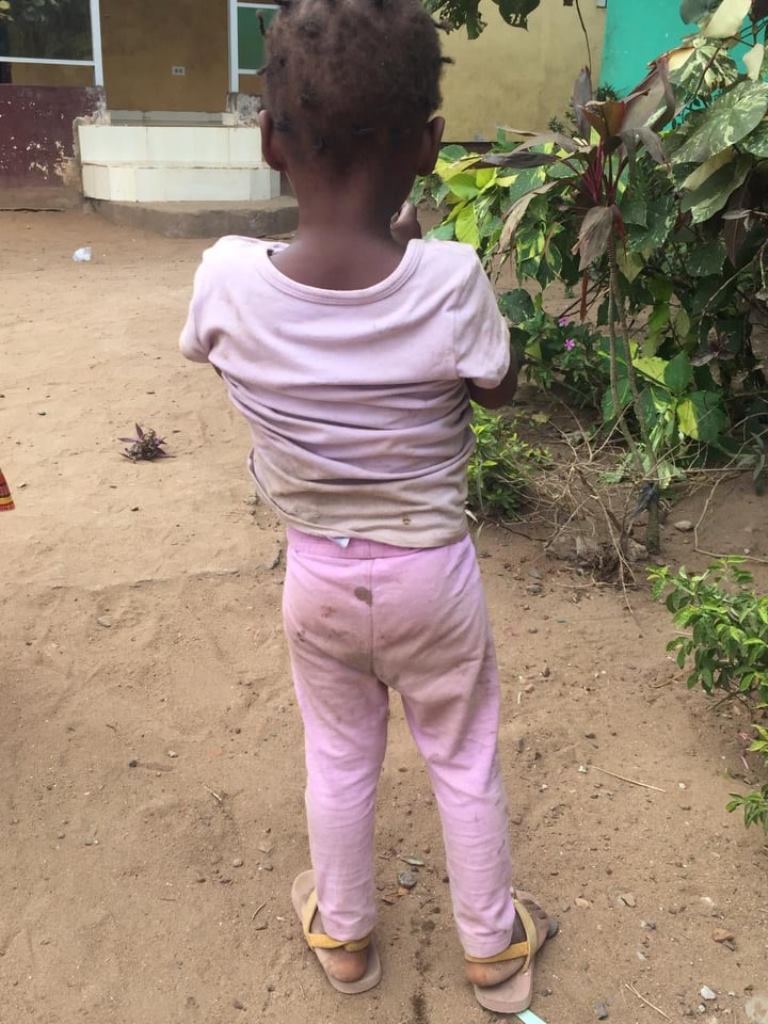
Monrovia – A frail girl sits quietly on a wooden bench. A silky dress is pulled over her knees. Her face is a vision of fear. Tracy, not her real name, is only ten, but she has already suffered the trauma of rape.
This story first appeared on FrontPageAfricaOnline as part of a collaboration for the West Africa Justice Reporting Project.
At first Tracy doesn’t want to talk. She chews her fingernails and barely lifts her head as two reporters sit down to talk with her. Finally, tears streaming down her face, Tracy began her story.
The alleged perpetrator, a 52-year-old man named Bobby Doebah, is someone she knows, too well. They both sleep in the same home; she even calls him Uncle Bobby. He is the stepson of Tracy’s grandmother. One day, says Tracy, while they were in the yard and when nobody was paying attention, Doebah instructed her to follow him.

“Come let’s go in the block house,” he said according to Tracey. “When I followed him, he put me on the ground and put his toto (penis) inside me, and he covered my mouth with his hand. I was in nightgown trousers in the morning when he did it to me first, and he used to do it every day. He took out one big knife and say, if I talk it, he will kill me.”
Tracy is the oldest of four children between age three and eight years old, who were allegedly assaulted by the same man. Doebah, who vehemently denies all allegations of raping the girls, was arrested in February by the Women and Children Protection Section (WACPS) of the Liberia National Police.
A medical report submitted by WACPS from Hope for Women Hospital found that of the four victims, only Tracy was raped with a penis. The other girls were penetrated with fingers.
Doebah is currently in the Monrovia Central Prison awaiting trial. Under Liberia’s Rape Law of 2005, rape is a non-bailable offence.
For Tracy, that is one bit of good news.
“I am feeling good that he is in jail,” she says.
At her young age, Tracy doesn’t know that she’s luckier than most others in her situation. Experts say it’s likely a tiny fraction of rapes is ever reported because of the shame it brings to the victim and the family. Fewer cases still result in the rapist facing charges.
Liberian police are often reluctant to bring rape charges or they are dismissive of complainants. Liberia’s weak justice system also struggles to deal with rape cases. Just 28 cases went to trial in 2018 according to the Ministry of Gender. 302 accused perpetrators are currently awaiting trial; some of them have been waiting for many years. Doebah faces a long wait in difficult conditions. The prison where he is has an official capacity of 375 detainees, but the prison had over 1,071 in July 2018 of whom 75 percent (805) were awaiting trial.
This long wait time for trial was behind a recent bill in the legislature that would make rape a bailable offense. Some offenders who may be found innocent will have to endure years in jail before being cleared. Legislators are yet to vote on it.
According to the Rape Law, “Conviction of First-degree rape – defined as rape involving a minor, rape that results in serious injury or disability, or rape committed with the use of a deadly weapon – is punishable by up to life imprisonment. Conviction of second-degree rape – defined as rape committed without the aggravating circumstances enumerated above – is punishable by up to 10 years.”
Despite the uncertainty of the data, no one doubts rape, particularly the rape of girls, is a serious problem in Liberia. The UN Women 2017 rape report found that: “Liberia is grappling with a high incidence of rape and other forms of sexual and gender-based violence against women and girls.” The report says “though rape is illegal, the government did not enforce the law effectively, and rape remained a serious and pervasive problem.”

As the nation’s newspapers carry more and more stories of rape on the front pages and women’s rights advocates make ever louder demands for action, the issue has never been more central in the national debate. Local and international partners, including UN Women, are trying to seize the moment to push for stronger laws and more engagement with community leaders to prevent violence against women and girls. Advocates say the new more open discussion around rape in Liberia is a positive step forward.
Activist Brenda Brewer Moore, who publicly revealed her own story of childhood rape in her movie “Stolen Childhood” in an effort to lessen the stigma, says she’s happy that there is now more public discussion and people feel more emboldened to come forward.
But she fears an increase in reporting is not matched by improvements in the police and judicial system, it could also spark a backlash. “My fear is that the numbers will drop because of people’s trust in the system. If they keep reporting and there is no action they may lose hope,” Brewer Moore says.
The reason for the high incidence of rape is widely debated. Many point to the war when women, girls and boys across the length and breadth of the country were forced to serve as war wives, raped constantly, sometimes for years at a time. According to the Truth and Reconciliation Commission’s report, rebel groups and government soldiers used rape as a weapon of war.
Rosana Schaack, Rivercess County Representative, who founded the women and girls safe home Touch Humanity in Need of Kindness (THINK), has over twenty years’ experience in dealing with rape cases. Schaack says there is no one reason why people rape, but she does believe that untreated trauma from the civil war could be a factor. She also fears that those who were raped as children often go on to commit the crime themselves.

“People who rape are just sick in the heads,” Schaack said on a panel at the 2019 International Women’s Day event. “We have not had any mental health recovery programs after the brutal civil war when they perpetrated violence against women and girls.”
Rev. Katura York Cooper, of Empowerment Temple AME Church calls on the churches to do more to counsel their parishioners against committing sexual violence.
“I asked in our chat room of bishops and clergy people if they preach about sexual gender-based violence in their various churches. Sadly, nobody replied. Mind you, these are the very people who do a lot of commentaries on politics,” she stated.
According to the police charge sheet, Doebah was named as a perpetrator after a neighbor, identified only as “Sweetie” uncovered the alleged assaults.
“The Sunday evening before the February 11th Armed Forces Day celebration, she went out to get cool air and met the other ladies discussing the issue of men using their fingers to rape children,” Sweetie told police according to the charge sheet. “She listened and made a few inquiries about the issue. When she was about to leave, they jokingly mentioned that ‘Tracy was Bobby’s woman (wife) because whenever he finished bathing, she always entered his room.’”
“On Monday, February 10th, I was outside packing my dishes, while Bobby was peeling ginger in the big chair and the eight-year-old victim went in to him,” Sweetie is quoted as saying. “I noticed that all of a sudden, the whole place turned quiet, so my mind ran on our discussion the previous night, and I took off my slippers and tiptoed in the house. I met the little girl lying on her back with her legs opened while Bobby hand was between them, but the moment (Bobby) saw me, he acted as if he was scratching his hair. So, I went inside, and the little girl jump from the chair and went outside and he covered the ginger and walked on the road.”
“When I later called the girl and asked what the alleged perpetrator was doing to her, she confessed that he was using his finger in her as he was always doing with her and the other kids daily. I told her mother [victim’s mother] and when she asked him about it, he said it was a lie. The child’s mother immediately took her daughter to the clinic and the nurse said that she was touched and it seems like something that was being done like every day,” Sweetie said.
Sweetie said after the first victim was confirmed to have been molested, the parents of the other girls named by the 8-year-old victim, started asking their children and they all said that he been fingering them every day, and that he used to buy them biscuits, candies and sometimes give the money for recess.
Bobby Doebah, denies all the allegations. Speaking to a reporter who visited him in his cell at Central Prison, South Beach in Monrovia, Doebah said he was innocent.
“I have three children, and my last child is almost four years old, so why would I rape a three-year-old baby?” he asked. Wearing an orange prison trousers and a camouflage T-shirt, Doebah said the allegations were part of a plot against him.
“I just love children and all the little children like me because I always give them money for their recess, so their mothers have programmed the children to lie against me,” he said. “But I can swear against anything and even swear on the holy bible that I did not rape any child.”
Despite his protests of innocence, Doebah’s 75 year-old father has already passed judgment. He has refused to visit his son since his detention at the facility, because he said his son has embarrassed him.
“I will not back my son, because he is very wicked; I want him to face whatever punishment given him for his devilish act,” said Old man Doebah. “I do not care of what my kinsmen would say. I do not back wrong. So if my son did good job, let him get his pay.”
If he is found guilty, Doebah faces life imprisonment. Tracy faces a life sentence, too.
She still harbors the fear of “Uncle Bobby” returning to make good his promise of killing her if she utters a word to anyone. Every time she says his name, she steals glances as if to check she is safe. The experience of other rape survivors suggests Tracy will struggle with the emotional consequences of these rapes for the rest of her life. She may also be stigmatized in her community. This is her reality, now.
